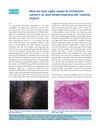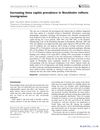TLDR Tinea capitis in adults, especially postmenopausal Black women, needs prompt treatment with oral antifungals to avoid scarring.
The review on tinea capitis (TC) in adults highlights its epidemiology, risk factors, clinical presentations, and management. TC, though more common in children, is increasingly reported in adults, particularly postmenopausal African American or Black women. Risk factors include crowded living conditions, proximity to animals, immunosuppression, and living with affected children. Diagnosis involves fungal culture, KOH preparations, and trichoscopy, with PCR showing higher sensitivity. Effective management requires oral antifungal therapy, with griseofulvin and terbinafine being common choices. Rising antifungal resistance underscores the need for antifungal stewardship. Delayed diagnosis can lead to scarring alopecia, emphasizing the importance of prompt and accurate diagnosis and treatment.
 1 citations
,
January 2015 in “Indian journal of dermatology, venereology, and leprology”
1 citations
,
January 2015 in “Indian journal of dermatology, venereology, and leprology” A woman's scalp infection caused by a fungus led to permanent hair loss and was hard to treat but responded to a specific antifungal.
196 citations
,
November 2014 in “PubMed” Tinea infections need proper diagnosis and treatment with topical or oral antifungals based on severity and location.
24 citations
,
July 2009 in “Mycoses” A scalp infection was treated successfully, leading to full hair regrowth.
 52 citations
,
January 2004 in “Medical mycology”
52 citations
,
January 2004 in “Medical mycology” The rise in tinea capitis cases in Stockholm is linked to increased African immigration.
16 citations
,
March 1991 in “International Journal of Dermatology” Tinea capitis is rare in healthy adults but should be considered in scalp issues.
 1 citations
,
January 2021 in “Our Dermatology Online”
1 citations
,
January 2021 in “Our Dermatology Online” A scalp infection can look like alopecia areata and get worse if treated incorrectly.
 10 citations
,
January 2016 in “Dermatology online journal”
10 citations
,
January 2016 in “Dermatology online journal” Adults with persistent scalp issues unresponsive to typical treatments should be tested for the fungal infection tinea capitis to start the right antifungal medication.
 65 citations
,
January 2005 in “American journal of clinical dermatology”
65 citations
,
January 2005 in “American journal of clinical dermatology” Children with scalp fungal infections need proper diagnosis and treatment, usually with antifungal medications, and newer drugs may offer quicker recovery.




